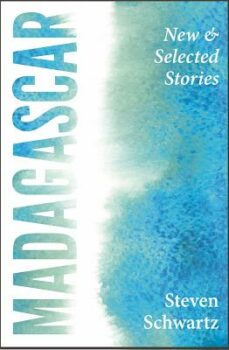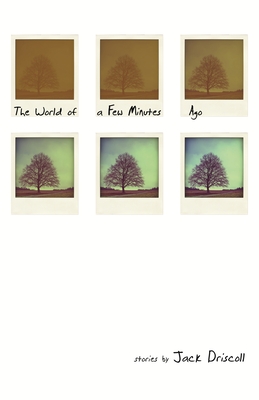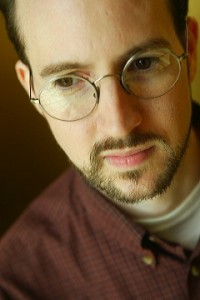 Kevin Brockmeier is one of the most inventive writers of his generation. In the tradition of Italo Calvino, his work is pervaded by a sense of the metaphysical mysteries that lurk beneath the range of everyday experience. His most recent novel, The Illumination, traces the lives of five characters as they adjust to a world in which wounds—internal and external—have suddenly begun to give off light. In the New York Times, Scott Hutchins writes that “in a touch that’s at once dark and profound, Brockmeier suggests that the illumination makes our suffering not just visible but beautiful.”
Kevin Brockmeier is one of the most inventive writers of his generation. In the tradition of Italo Calvino, his work is pervaded by a sense of the metaphysical mysteries that lurk beneath the range of everyday experience. His most recent novel, The Illumination, traces the lives of five characters as they adjust to a world in which wounds—internal and external—have suddenly begun to give off light. In the New York Times, Scott Hutchins writes that “in a touch that’s at once dark and profound, Brockmeier suggests that the illumination makes our suffering not just visible but beautiful.”
In April, Mary Stewart Atwell met Kevin Brockmeier at his first reading at his alma mater, Missouri State University. In this interview, conducted via e-mail correspondence over the following few months, they speak about metaphor, the line between realist and fantasy fiction, and the pleasures of not living in New York.
Brockmeier is the author of three adult novels, two collections of short stories, and two novels for children. He lives in Little Rock, Arkansas.
Interview:
Mary Stewart Atwell: This winter, the writer Jacob Appel published an article in The Writer’s Chronicle titled “The Quest for the World’s Saddest Metaphor: The Heartrending Genius of Kevin Brockmeier.” He describes your work as distinguished by what he calls “grand metaphor,” defined as “both so extraordinary that it pushes the limits of human imagination, and so persistent as to encroach into nearly every aspect of the underlying story.” In the process of writing, do you feel that you’re engaged in building a grand metaphor? If so, is that the element of a story that usually comes to you first?
I don’t know that you’ll find a single overarching metaphor that operates as a bridge between my books, if that’s what you mean, but, yes, many of my best stories are founded in metaphor, though I would hazard to say that very few of them are actually in open dialogue with metaphor. In other words, I’ll often find myself envisioning a story out of some symbol whose potency seems immediately apparent to me—and will seem equally apparent, I hope, to my readers: a ceiling that flattens an entire community, a coat that reproduces people’s prayers on slips of paper, a city of the dead but not yet forgotten, a change in the operation of the world that invests people’s injuries with light. But when I actually sit down to write, I’ll treat that symbol as a real phenomenon. I’ll establish a metaphor as the root principle of a story and then ignore its metaphorical qualities in favor of its physical qualities. I try to let my readers do most of the symbol-work themselves, so that whenever some symbol begins to perform a little dance of light on the surface of the story, it will be because they have brought it there rather than me.
You’re in the enviable position of being a full-time fiction writer. What are your days like? Do you ever feel that you’re not being as productive as you should be?
I can’t deny there are days—months, even, particularly these last few—when I get shamefully little work done. But I try. When I’m home, presuming I’m healthy, I devote as much of the day to writing as I can. I typically work from nine-thirty or ten in the morning to at least dinnertime, but I’m often more productive during my supposed post-work evening tinkering time than I am during my proper working day. The truth is that, hour by hour, I get very little done, but there are an awful lot of hours wrapped up in every story I write. The only thing I can say I’ve learned for certain is that the more time I’m able to spend writing, the more I’ll eventually, slowly, painstakingly, accomplish. I’ve spoken elsewhere about my working methods—how I broach my sentences one tiny piece at a time, termiting away at them until I’m satisfied that they present the right effect. I’m fairly certain that, as a reader, I can tell when a writer is investigating words for their insinuations, their dim traces of other times and places, trying to fit each unusual shape properly to the next, and I spend my days trying to do the same.
One of your point of view characters in The Illumination is a novelist and short story writer, and other characters in other work also comment on the act of writing. In this context, I’d like to ask you about a moment from The Brief History of the Dead. After the journalist Luka Sims has decided that he’s the only person left in the city of the dead, he thinks about what working on the newspaper that covers the city has meant to him: “When he was working on a story, he felt as though he were a paleontologist uncovering a set of bones, chipping away at the world until he had enucleated some small, hard object he could catalogue and carry away in his hands: a skull, say, or a breastbone.” Did you see this as a comment on the writing process? Is writing a story like uncovering an artifact?
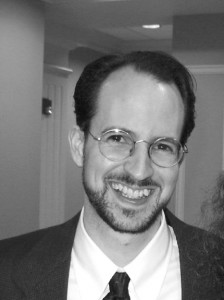 I think that writing a sentence is like uncovering an artifact—at least if you’re writing it well. Nina Poggione, the writer in The Illumination, talks about “the thrill she got, the feeling of wondrous correctness, when a handful of words she had been organizing and reorganizing suddenly fastened themselves together, forming a chain that seemed to tug at the page from some distant, less provisional place, as if through an accidental pattern of sounds, rhythms, and insinuations she had linked herself to the beginning of the world, a time when words were inseparable from what they named and you could not mention a thing without establishing it in front of your eyes.” That’s the metaphor that comes the closest to how I’ve been thinking about writing lately, along with something I read in an interview with Barry Lopez: “Your work is to take care of the spiritual interior of the language. In Japanese this word we use, kotodama, means that each word has within it a spiritual interior. The word is like a vessel that carries something ineffable. And you must be the caretaker for that.”
I think that writing a sentence is like uncovering an artifact—at least if you’re writing it well. Nina Poggione, the writer in The Illumination, talks about “the thrill she got, the feeling of wondrous correctness, when a handful of words she had been organizing and reorganizing suddenly fastened themselves together, forming a chain that seemed to tug at the page from some distant, less provisional place, as if through an accidental pattern of sounds, rhythms, and insinuations she had linked herself to the beginning of the world, a time when words were inseparable from what they named and you could not mention a thing without establishing it in front of your eyes.” That’s the metaphor that comes the closest to how I’ve been thinking about writing lately, along with something I read in an interview with Barry Lopez: “Your work is to take care of the spiritual interior of the language. In Japanese this word we use, kotodama, means that each word has within it a spiritual interior. The word is like a vessel that carries something ineffable. And you must be the caretaker for that.”
You live in Little Rock, Arkansas, fairly distant from literary and publishing centers. How has living there affected your career?
Well, there are literary centers and then there are publishing centers, and it’s important to distinguish between the two. New York is unquestionably the publishing center of the United States, and I’m sure there are certain social opportunities that aren’t available to me because I happen not to live there. But the literary center? I would suggest that the literary center of the United States is anywhere you can read the best books that have been published and find a quiet place to write. Which is to say, anywhere at all. That’s one of the advantages that writing has over, say, performing: you don’t have to live in a beehive of public activity to participate in the strongest currents of your art form. When it comes to literature, there’s no such thing as the provinces. The thing to emphasize is that I like Little Rock and I’m living where I want to live.
Do you think that young writers are in an unnecessary hurry to move to New York?
Who can say? I think that if you want to live in New York and can afford it, then by all means you should, but it would be a mistake to imagine that living in New York is your obligation as either a writer or a participant in the greater literary culture. You should live wherever you believe you can construct the most satisfying life for yourself. Beyond that, I would suggest that any town will reveal its riches to you when you treat it as your home, as where you would rather be, instead of as a place to bide your time.
You served as the guest editor for Real Unreal: Best American Fantasy Volume 3. In the preface, the series editor, Matthew Cheney, describes you as “one of the writers who reveals the complexities (and absurdities!) of…a dichotomy” between genre fiction and literary fiction. Do you agree with this characterization? In a story like “The View from the Seventh Layer,” was the switching back and forth between realism and science fiction elements part of your project from the beginning?
I agree with Matthew that good genre fiction offers the same pleasures and ambitions as any good fiction does and that it would probably make more sense and inspire a better and more resilient literary discourse if we could fold the two categories together and simply begin distinguishing between books according to their vitality and their degree of accomplishment rather than their genre affiliations. Take a science fiction and fantasy writer like Walter Tevis or Peter S. Beagle and compare him to a literary fiction writer like Steven Millhauser or Jose Saramago, and you’ll see the similarities—namely, that they’re authors of tremendous vision, great craft, and a complex and absorbing sense of what it means to be alive who happen to be interested in exploring the otherworldly or the impossible or the ten-thousand ways the familiar encases the strange—long before you’ll see the differences. In the case of “The View from the Seventh Layer,” Olivia, the story’s heroine, fails to recognize that there is a border between the real and the fantastic, and I tried my best to adopt her perspective while I was writing it.
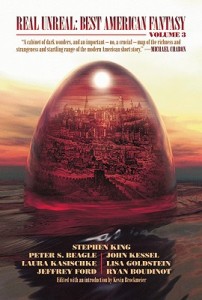 Many people who have seen you read know that you’re an inveterate keeper of lists—of favorite movies, books, music. In the introduction to Real Unreal, you provide a list of your top ten fantasy stories, including some, like James Salter’s “Akhnilo,” which many readers wouldn’t consider fantasy. As a reader, do you often find yourself sniffing out fantasy elements that seem to slip by others?
Many people who have seen you read know that you’re an inveterate keeper of lists—of favorite movies, books, music. In the introduction to Real Unreal, you provide a list of your top ten fantasy stories, including some, like James Salter’s “Akhnilo,” which many readers wouldn’t consider fantasy. As a reader, do you often find yourself sniffing out fantasy elements that seem to slip by others?
I would have thought that the James Salter story was quite self-evidently fantasy. How else would you categorize a story about a man to whom the universe quite literally speaks its mysteries? Of course, if that man is drunk or crazy, then you’ve simply got a realistic story whose body is wobbling on the legs of a broken consciousness. In the absence of firm evidence to the contrary, though, I’ll favor the fantastic reading of a story over the lunatic reading every time. What this means, I suppose, is (1) that I find fantasy more interesting than either madness or inebriation and (2) that the answer to your question is “yes.”
I have another question about that list. Describing the writers, you reveal that one of the ten is the “writer whose work I treasure above all others.” I’d like to venture a guess at who it might be. Italo Calvino?
Ding, ding! Let’s say that an author should be judged by his five best books and his five best books alone. In Calvino’s case, in my opinion, those would be The Baron in the Trees, The Complete Cosmicomics, The Nonexistent Knight and the Cloven Viscount, Invisible Cities, and Marcovaldo. By that standard, it seems to me that he’s pretty hard to top, though William Maxwell and Leo Tolstoy are also strong contenders.
In your recent talk at Missouri State University, you commented that you like physical books better than screens, and that the Kindle didn’t hold much of an attraction for you. You also mentioned—and I have to admit that I didn’t pick up on this—that your “The Human Soul as Rube Goldberg Device: A Choose-Your-Own-Adventure Story” has a hidden page that will only be noticed if you read the story from back to front. As you’re writing, or when you’ve finished a book, do you think about the physical properties of the text? Are you inspired by work that plays with the physical possibilities of the book form?
I think that the book itself is often a very appealing aesthetic object—in its texture, size, appearance, heft, and aroma; in the islands of black text it places in seas of white space; in the crispness and contours of its type—and that right now, as we speak, we’re living in a golden age of book design. That said, when I’m reading fiction, it’s the words themselves that matter most to me. In all my happiest reading experiences, I’ve felt unmoored from the physical elements of the book, wholly engaged by the rhythms and melodies of the language and adrift in the continuous waking dream of the story. That’s what I’m hoping for whenever I start reading a book, and in that context, I usually find experiments that call attention to the concrete properties of the text an exasperation. As for my own work, I tend to think in metaphors of shape. I might not know exactly how a book or a story will look in its final published form, but I know the configuration by which I want it to function. The Illumination, for instance, I conceived of as something like a set of six transparencies, each nearly the same size and containing its own seemingly abstract fragments of line and color, which finally, when layered one on top of the other, would reveal a single complete image.
In that talk, you also revealed that the Chuck Carter section in The Illumination is based on a constraint: ten words to each sentence. It made me think of Oulipean writers like Harry Mathews, who have used similar constraints in their published fiction. Are the writers of Oulipo an influence on your work?
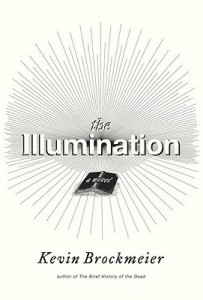 The only Oulipo writers I’ve read with much diligence are Calvino, Harry Mathews, and Georges Perec, but I appreciate all three of them, and I think that the Oulipo project itself—as I understand it, to prod the imagination out of its usual habits by applying certain artificial pressures to it—is a valuable one. The ten-word sentence rule in Chuck’s section of The Illumination is the most demanding constraint I’ve ever imposed on myself, but I doubt I’ve ever written a story that didn’t construct and attempt to abide by (and occasionally very deliberately to violate) its own set of rules. All those questions you answer for yourself in a story’s opening paragraph—every point-of-view decision, every vocal mannerism, every distillation of tone and rhythm—they’re all constraints of one kind or another, aren’t they? At least that’s how I see them. But I usually begin a story with other constraints, too, or at least methods of operation, that are firmly in place before I write so much as the first sentence. Three examples: (1) in the second section of The Truth About Celia, “Faces, and How They Look from Behind,” I decided to hand the narrative off to a new point-of-view character at each paragraph, allowing the consciousness behind the story to float from person to person along the current of their physical proximity; (2) in Nina Poggione’s section of The Illumination, I planned to (and did) resume the story after every space break in a new bookstore, in a new city, with a run-on sentence that would become longer at every interval, until it was filling whole pages; and (3) in “The View from the Seventh Layer”—the story, not the collection—I set out to craft every sentence as carefully as possible, but to treat each one as a solitary object, allowing the reader to forge the connections between them without my assistance, so that the story might seem to have a continually darting gaze inside it.
The only Oulipo writers I’ve read with much diligence are Calvino, Harry Mathews, and Georges Perec, but I appreciate all three of them, and I think that the Oulipo project itself—as I understand it, to prod the imagination out of its usual habits by applying certain artificial pressures to it—is a valuable one. The ten-word sentence rule in Chuck’s section of The Illumination is the most demanding constraint I’ve ever imposed on myself, but I doubt I’ve ever written a story that didn’t construct and attempt to abide by (and occasionally very deliberately to violate) its own set of rules. All those questions you answer for yourself in a story’s opening paragraph—every point-of-view decision, every vocal mannerism, every distillation of tone and rhythm—they’re all constraints of one kind or another, aren’t they? At least that’s how I see them. But I usually begin a story with other constraints, too, or at least methods of operation, that are firmly in place before I write so much as the first sentence. Three examples: (1) in the second section of The Truth About Celia, “Faces, and How They Look from Behind,” I decided to hand the narrative off to a new point-of-view character at each paragraph, allowing the consciousness behind the story to float from person to person along the current of their physical proximity; (2) in Nina Poggione’s section of The Illumination, I planned to (and did) resume the story after every space break in a new bookstore, in a new city, with a run-on sentence that would become longer at every interval, until it was filling whole pages; and (3) in “The View from the Seventh Layer”—the story, not the collection—I set out to craft every sentence as carefully as possible, but to treat each one as a solitary object, allowing the reader to forge the connections between them without my assistance, so that the story might seem to have a continually darting gaze inside it.
When placing these constraints on your work, how do you balance the story with the artifice? You mentioned “breaking your rules” a moment ago. When do you allow yourself to break the rules?
Usually I treat the rules as benevolent dictators, trusting that if I approach a story with enough care, it will take shape within its own constraints. Again, some of those constraints are pretty daunting, but often they’re just minor features I hope will lend a certain aesthetic polish to my writing and keep it turning inward toward its own energy. When I break the rules, it’s because I want a story to be perceived by its readers as violating its own terms of being. For instance, one of my stories, “A Fable Beginning with an Ice Slick and a Concrete Embankment”—which is uncollected; I wrote it for Esquire Magazine’s napkin project—consists of a single, nearly 2,300-word sentence tracing the observations of a man dying in a car accident. I tried to make the sentence both balanced and grammatically correct, which is to say diagrammable, rather than a long series of independent clauses merely spliced together with commas. It’s followed by a second, concluding, four-word sentence, “He was somewhere else,” a shift I hoped would be understood as a change in the narrative strategy commensurate with the change in the man’s situation.
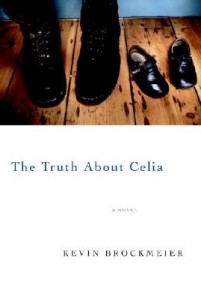 In the Writer’s Chronicle article, Jacob Appel comments that you’re the only writer who he wants to influence his writing. How do you feel about writers looking up to you as an inspiration?
In the Writer’s Chronicle article, Jacob Appel comments that you’re the only writer who he wants to influence his writing. How do you feel about writers looking up to you as an inspiration?
I suppose I should say here that I haven’t read the Writer’s Chronicle article, for the same reason that I avoid reading anything at all, good or bad, about myself: who is that guy, and why does he have my name? That said, I’m happy to think that other writers might take something of mine and absorb it into their imaginations. That’s how the interplay between reading and writing is supposed to work, isn’t it? You find a book that feels intimate to you, and it changes how you address the world. I know beyond question that my own writing has been shaped by the same maneuver, that I’ve been inspired by the writers whose books I admire, many of whom are older than me, of course, but some of whom began publishing around the same time I did (Kelly Link, Peter Orner, Kate Bernheimer, Thomas Glave, Goncalo Tavares) and some of whom a little later (Rebecca Makkai, Alejandro Zambra, Nick Harkaway, Karen Russell, Theodora Goss).
I’ve always found the children in your fiction—Caroline in “These Hands,” Robin in “Things That Fall from the Sky,” Chuck Carter in The Illumination—to be very convincing and moving. Apropos of writing about childhood, I’d like to ask you about a moment in your short story “The Ceiling.” The adult narrator is remembering a dream he had as a child about finding a door that led from his cellar into a drugstore: “For several days after, I felt a quickening of possibility, like the touch of some other geography, whenever I passed by the cellar door. It was as if I’d opened my eyes to the true inward map of the world, projected according to our own beliefs and understandings.” It struck me that children in general have the sense of such a world, just beyond the reach of our everyday experience, and that an awareness of that world is one of the things that makes for good fantasy writing. Do you find it easy to remember being a child, and if so, how does the ability to remember that time inform your writing?
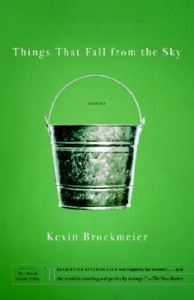 I’m thinking of something Virginia Woolf wrote about Lewis Carroll: “For some reason, we know not what, his childhood was sharply severed. It lodged in him whole and entire. He could not disperse it.” For a long time—certainly through my twenties—that’s how I felt about myself, as if my childhood occupied nearly all the space inside me and my adulthood was merely encapsulating it, cushioning it from the forces of my life like a layer of intracranial fluid. I found myself telling stories about children again and again because my own childhood was right there at the center of my mind. The Brief History of the Dead was an exception; I felt that I had been writing too relentlessly about childhood in my earlier books and so made a deliberate effort to restrict my focus to adults in that one. Then something changed, which is, frankly, that I went through a long period of ill health, one that spun me sideways and sent thirty-some years pouring down over my shoulders. Now, afterward—I hope afterward—I feel like a different person. Maybe my childhood is still whole and entire inside me, but it’s no longer the whole and entirety of me. (For what it’s worth, I think the book of mine, children’s novels aside, that casts its gaze most directly on childhood—a book that is, in many ways, about the effort to travel back through time along that gaze and see what you’ll find at the other end—is one you don’t mention: The Truth About Celia.)
I’m thinking of something Virginia Woolf wrote about Lewis Carroll: “For some reason, we know not what, his childhood was sharply severed. It lodged in him whole and entire. He could not disperse it.” For a long time—certainly through my twenties—that’s how I felt about myself, as if my childhood occupied nearly all the space inside me and my adulthood was merely encapsulating it, cushioning it from the forces of my life like a layer of intracranial fluid. I found myself telling stories about children again and again because my own childhood was right there at the center of my mind. The Brief History of the Dead was an exception; I felt that I had been writing too relentlessly about childhood in my earlier books and so made a deliberate effort to restrict my focus to adults in that one. Then something changed, which is, frankly, that I went through a long period of ill health, one that spun me sideways and sent thirty-some years pouring down over my shoulders. Now, afterward—I hope afterward—I feel like a different person. Maybe my childhood is still whole and entire inside me, but it’s no longer the whole and entirety of me. (For what it’s worth, I think the book of mine, children’s novels aside, that casts its gaze most directly on childhood—a book that is, in many ways, about the effort to travel back through time along that gaze and see what you’ll find at the other end—is one you don’t mention: The Truth About Celia.)
Religion, or, perhaps more accurately, theology, is a theme that pervades your work. In your collection Things That Fall from the Sky, one story follows students at a Christian school, while another describes a society where people tell and retell the story of Jesus as part of their cultural mythology. Then there’s The Illumination, where the light that shines out of people’s wounds seems to have a spiritual or mystical connotation. Would you say that religion is a productive theme for you—perhaps even a preoccupation—or is it something that just happens to come up?
I can’t deny that religion fascinates me, though I tend to think of most theology—and most philosophy, too—as a particularly healthy root ancestor of the literature of the fantastic. Ryan Shifrin, one of the characters in The Illumination, comments that “he had—or seemed to have—the religious instinct but not the religious mindset: his intuition told him that everything mattered, everything was significant, and yet nothing was so clear to him as that life presented a riddle to which no one knew the answer.” Well, me too. If there’s an arc to the way that religion has informed my writing, I would say that it’s this: in my earlier books, my interest in some facet of religious thinking or religious narrative often gave birth to my stories, but more recently other interests altogether have given birth to my stories, and I’ve simply allowed some of my characters to impose elements of religious thinking or religious narrative on their experiences. In other words, I used to take religion and build stories out of it, but lately I’ve been building stories and then applying religion to them.
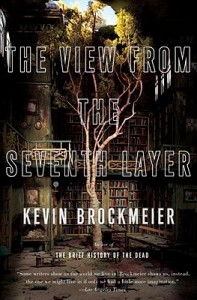 So would you say that this has had a greater effect on your process or on the stories themselves?
So would you say that this has had a greater effect on your process or on the stories themselves?
I would say that it’s had an effect on the kind of stories I conceive of writing in the first place—which is to say, I guess, on the stories themselves.
When I told my students at Missouri State that I was doing this interview with you, I offered them the chance to submit questions to be included. I’ll end with two of them:
1) Do you ever find that you dislike a story you’re working on but keep working on it because you feel committed to it?
I do. I feel the same obligation to stories that I do to sentences: I have to finish each one before I can comfortably move on to the next. This isn’t necessarily a wise practice, and it might even be a ludicrous one, but I haven’t been able to shake it.
2) Do you watch television, and if so, what are your favorite shows?
I’ve only ever had broadcast reception, and a couple of years ago, after the digital transition, the TV I own ceased collecting a signal, but I’m gradually exploring some of the more interesting currents and byways of the last few years, series by series, on DVD. I doubt I can offer too many surprises here, but my favorite shows—the ones I love without qualification—are Freaks and Geeks, The Wire, Once and Again, and Star Trek: Deep Space Nine. Right now some friends and I are watching Battlestar Galactica at the rate of an episode a week, and I’m also watching half an episode of The Sopranos a day while I exercise. The first show I remember truly investing with the whole of my imagination, though, was the Adam West version of Batman, and particularly Yvonne Craig’s Batgirl, a character with whom I was madly in love from the age of four to the age of seven.
Further Links and Resources:
- Listen to NPR’s Alan Cheuse’s review of The Illumination.
- Read Salon’s rave of The Brief History of the Dead.
- Check out Kevin Brockmeier’s recommendationsfor movies, books and music in Poets & Writers.
- Buy one of Kevin Brockmeier’s novels or short story collections from your local independent bookseller.


